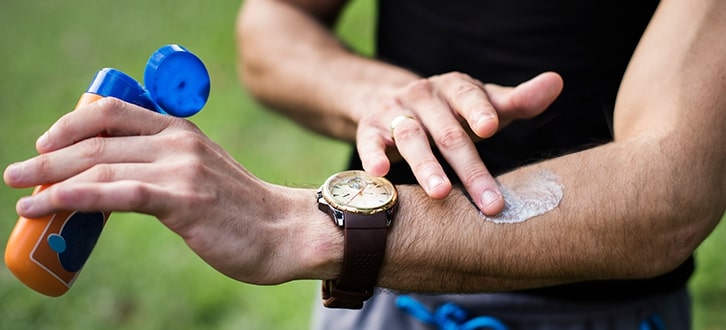What you can do to prevent skin cancer
Author: CenterWell Pharmacy
Date Posted: Jun. 21, 2022

As we enjoy sunny days and warmer temperatures during Summer Sun Safety Month, we must remember the importance of protecting ourselves from the sun’s harmful rays. Although vitamin D—the sunshine vitamin—is important for your overall health and well-being, it’s crucial to take the necessary precautions when exposing yourself to direct sunlight.
Skin cancer is the most common type of cancer. It usually develops on skin exposed to the sun but may occur on areas that are not. The good news is, if caught early, it’s treatable.¹
Here at CenterWell Pharmacy®, we prioritize your health and well-being. As part of Summer Sun Safety Month, we want to help you stay safe in the sun by explaining the different types of skin cancer, how to protect your skin with sunscreen and more.
The types and risks of skin cancer
Skin cancer occurs when the DNA in skin cells is mutated by damage from the sun or other risk factors.¹ If you have skin cancer, it’s important to know the type because it may affect how your healthcare provider treats you.
3 common types of skin cancer
Basal cell carcinoma
Basal cell carcinoma is the most common type of skin cancer. It develops on areas most exposed to the sun, including the face, head and neck. Basal cell carcinoma may look flat, flesh-colored, or scar-like. It can also appear as a pearly or waxy bump or a scabbing sore that heals and returns.¹
Squamous cell carcinoma
Squamous cell carcinoma is another common type of skin cancer that develops on sun-exposed areas. Squamous cell carcinoma may appear as a firm, red nodule or a flat lesion with a scaly, crusted surface.¹
Melanoma
Melanoma is less common than other skin cancer types but is more dangerous. It can show up anywhere on your body and can occur on skin that hasn’t been sun exposed. Melanoma appears on the skin as unusual moles; small lesions that appear red, white, blue or blue-black; painful lesions that itch or burn; and dark lesions.¹
Who is at risk of skin cancer?
Anyone is at risk of getting skin cancer. However, some people are at higher risk than others, such as those who have:¹
- Fair skin
- Sunburns
- Moles
You’re also at higher risk of getting skin cancer if you have a weak immune system, a family history of skin cancer or spent too much time in the sun. If you’re concerned, speak with your healthcare provider about your risk of getting skin cancer.
Protecting your skin
As Summer Sun Safety Month emphasizes, taking preventive measures and being aware of the signs and risks of skin cancer can significantly reduce the likelihood of its occurrence.
For example, SPF, or sun protection factor, rates the level of protection against ultraviolet B (UVB) and ultraviolet A (UVA) rays, which may cause sunburn and increase the risk of skin cancer. We recommend a broad-spectrum sunscreen because it absorbs and reflects UVB and UVA rays, which causes the skin to age and wrinkle.
Knowing which SPF to buy can be confusing with all the options, but we recommend a sunscreen with SPF 30 or higher. Although SPF 15 only blocks about 93% of UVB rays, SPF 30 blocks 97%, and SPF 50 blocks 98%. SPF 30 and 50 last the same amount of time, so it’s important to reapply every 2 hours, especially if you’re directly in the sun.²
There are other steps you can take to protect yourself and lower your risk of skin cancer:¹
- Avoid the sun during the middle of the day. UV rays are strongest between 10 a.m. – 4 p.m.
- Wear protective clothing. Dark clothing that covers your arms and legs and a broad-brimmed hat can be helpful.
- Avoid tanning beds. The lights emit UV rays that can increase your risk of skin cancer.
Finally, talk to your pharmacist if you take sun-sensitizing medications. Some over-the-counter (OTC) drugs and prescriptions, including antibiotics, may cause your skin to be more sensitive to the sun.
Getting help
If you have any skin cancer concerns or need help finding the right sunscreen on our OTC store, our pharmacists are here to support you during Summer Sun Safety Month and all year long. You can reach our pharmacists by calling 800-379-0092 (TTY: 711), Monday – Friday, 8 a.m. – 11 p.m., and Saturday, 8 a.m. – 6:30 p.m., Eastern time.
For more information, visit the CenterWell Specialty Pharmacy® Cancer Center of Excellence. You will find resources for financial assistance, emotional support and pharmacists available 24/7.
Disclaimer: This material is provided for informational use only and should not be construed as medical advice or used in place of consulting a licensed medical professional. You should consult with your doctor to determine what is right for you.
Other pharmacies may be available in our network. You can locate network pharmacies by visiting Humana.com/finder/pharmacy.
Sources:
- “Skin cancer,” Mayo Clinic, last accessed July 31, 2023.
- Arlene Ruiz de Luzuriaga et al., “Feel the burn? Explaining the science of sunscreen,” UChicago Medicine, last accessed July 31, 2023